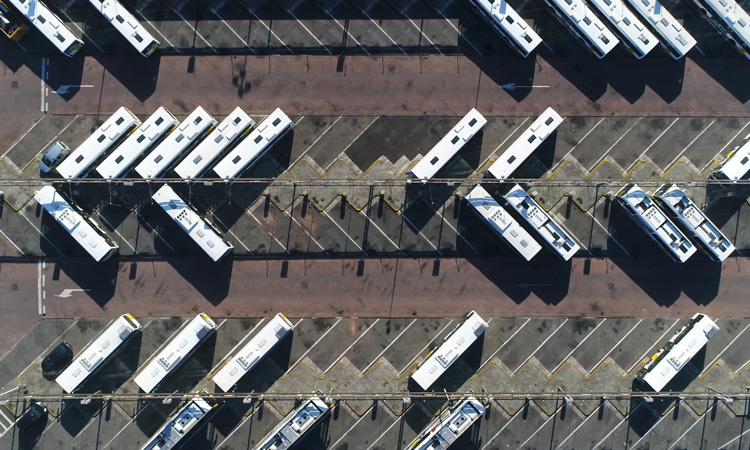Rethinking bus transportation
- Like
- Digg
- Del
- Tumblr
- VKontakte
- Buffer
- Love This
- Odnoklassniki
- Meneame
- Blogger
- Amazon
- Yahoo Mail
- Gmail
- AOL
- Newsvine
- HackerNews
- Evernote
- MySpace
- Mail.ru
- Viadeo
- Line
- Comments
- Yummly
- SMS
- Viber
- Telegram
- Subscribe
- Skype
- Facebook Messenger
- Kakao
- LiveJournal
- Yammer
- Edgar
- Fintel
- Mix
- Instapaper
- Copy Link
Posted: 11 February 2020 | Pierre Gourdain - FlixBus USA | No comments yet
In the race towards sustainable transport, Pierre Gourdain, Managing Director of FlixBus USA, explains how the bus, with further stakeholder collaboration, is the mode of transport that will come first.


The mobility world is booming with innovation – e-scooters, self-driving cars, electric mopeds – and it seems there are more alternatives than ever to get from point A to point B. One familiar service remains strong throughout all of this – the intercity bus. However, we need to rethink bus travel and take a revolutionary approach instead of an evolutionary one. It’s important we look at the complete picture, from how tickets are purchased to the environmental impact our transportation decisions have.
We’re doing exactly that at FlixBus. We believe in providing smart and climate friendly mobility options for people to experience the world around them. Ultimately, this is empowering them to feel good about their travel decisions and make a real contribution towards combating climate change. Now is the time we need to make intentionally sustainable choices when it comes to travel, and the bus fits that bill.
Sustainability at FlixBus
Since our inception, we’ve pushed the ‘green’ envelope in more ways than one. By offering a fully digitalised booking experience, we eliminate paper waste and prove that sustainability starts before the journey even begins.
In terms of the journey itself, the numbers tell us that travelling by bus is one of the most climate friendly ways of long-distance transportation. A typical FlixBus emits only 23 grams of CO2 per kilometre per person. Based on numbers from the German Environment Agency and the Heidelberg Institute for Energy and Environmental Research, this is more than six times less than travelling by car (139g/km) and almost nine times less than travelling by plane (201g/km).
In terms of the journey itself, the numbers tell us that travelling by bus is one of the most climate friendly ways of long-distance transportation
Of course, we also understand that bus travel is not 100 per cent CO2 neutral. To counter this, we offer passengers the option to add “CO2 Compensation” to their trip, thereby making a voluntary environmental contribution when completing their booking. Every CO2 Compensation donation in the U.S. is invested in the National Forest Foundation (NFF) as well as a second and certified Global Climate Protection Project from abroad.
We’re also proud to have piloted and regularly offer buses that run on alternative energy sources including hydrogen and electricity. In the U.S. for example, we recently partnered with MCI to test America’s first long-range bus with 100 per cent battery power. We will also be adding bike racks to a number of buses this year – an important amenity for our passengers wanting to go the extra green mile.
Preventing CO2 emissions and how operators can help
Our research proves that the desire for car-ownership alternatives exist and people are becoming more conscientious of their carbon footprint and of the impact their travel has. Students who used FlixBus to travel home for the holidays in 2018 saved the planet 276 million grams of C02 – and this is just an analysis for four colleges. The total of CO2 emitted by all the students travelling from the four universities amounted to 54 million grams. If the same journeys were undertaken by car the amount would have been more than six times that – 330 million grams.
We believe in providing smart and climate friendly mobility options for people to experience the world around them
The bus is experiencing a renaissance of sorts — and in the U.S. alone we know we’re tapping into a demographic that might not have considered taking a bus before (63 per cent to be exact!). It’s an exciting time to board the bus – but we need manufacturers to help in this effort. We need more manufacturers developing electric buses, and those that run on alternative fuel sources like hydrogen and biogas. When that happens, we can expand our fleet to include even more climate friendly buses.
While there is much to be developed, the future holds an exciting uncertainty. We know that change is inevitable, but we can also confidently say that buses have and will continue to stand the test of time.
Biography
Pierre was born and raised in France where he studied Political Science at the Institut d’Etudes Politiques de Paris and holds an MBA from INSEAD. He is currently the Managing Director of FlixBus USA. Pierre joined FlixBus in 2015 where he successfully helped the company expand to France, and then to Spain, Belgium and the UK.
Before joining FlixBus, Pierre worked in government and as a consultant for the French Presidency and co-wrote a book about technological disruptions that has been published in six countries. He splits his time between the two FlixBus offices in New York and Los Angeles.
Related topics
Alternative Power, Fleet Management & Maintenance, Mobility Services, Sustainable Urban Transport
Related modes
Bus & Coach
Related organisations
FlixBus








